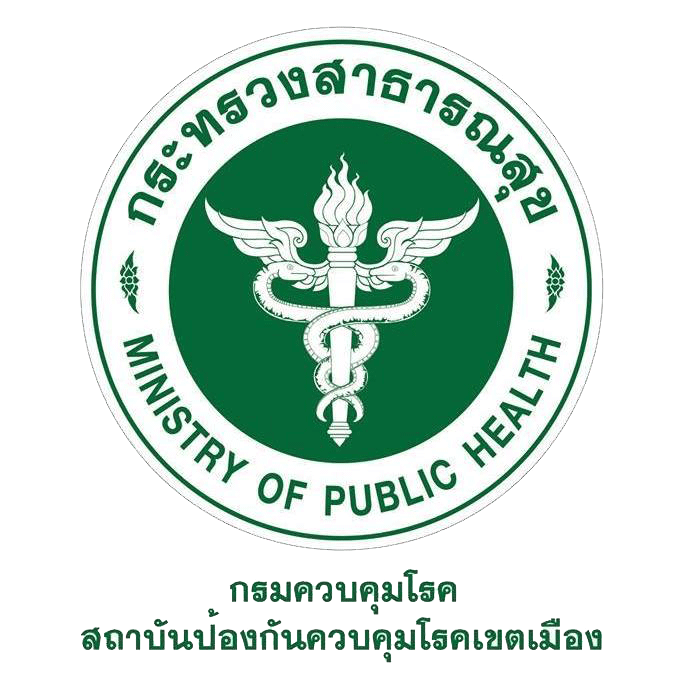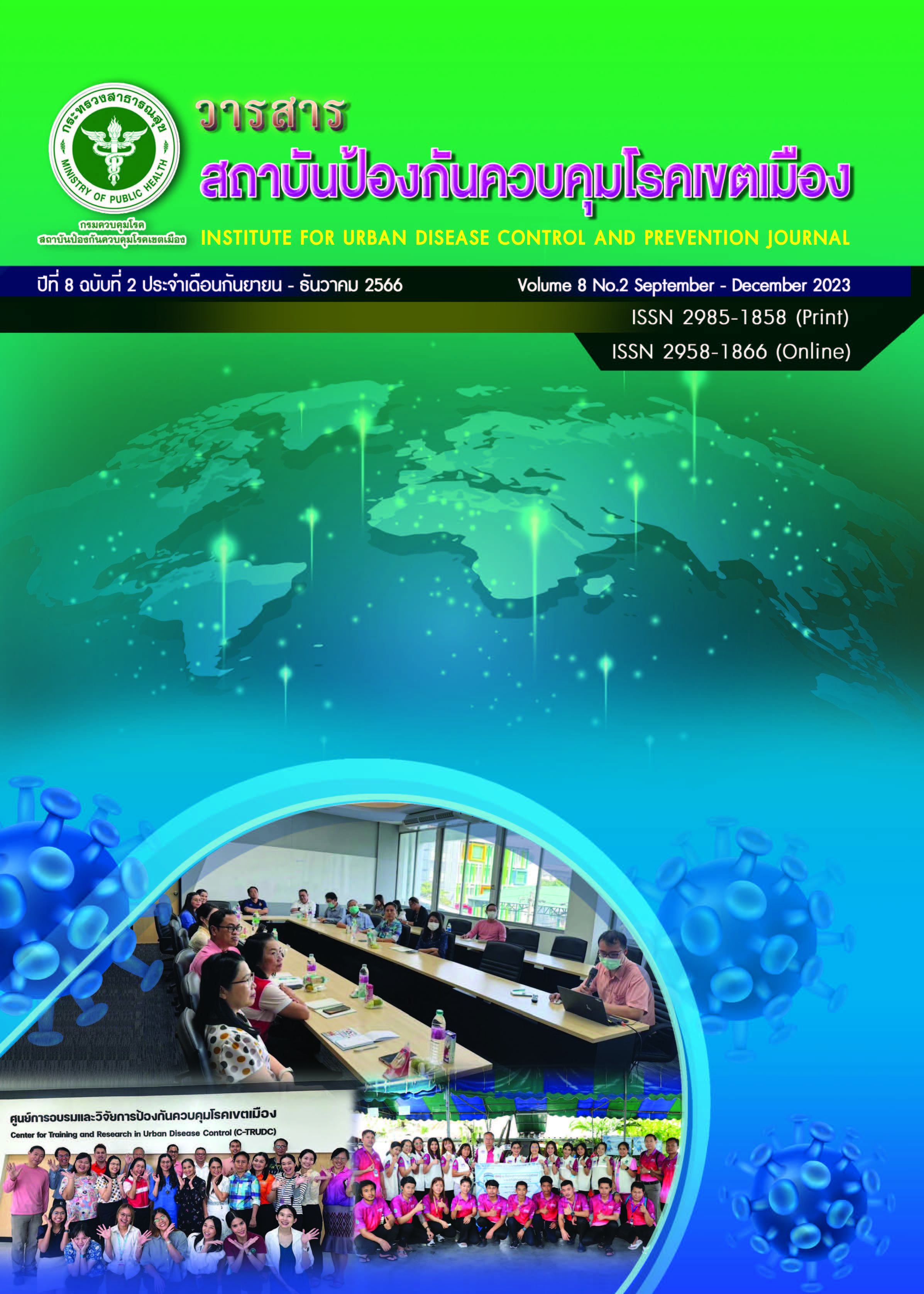ความรู้ และทัศนคติ ต่อการป้องกันโรคฝีดาษวานรของผู้ปฏิบัติหน้าที่คัดกรองโรคและผู้ปฏิบัติงานช่องทางเข้าออกระหว่างประเทศในประเทศไทย
Main Article Content
บทคัดย่อ
การวิจัยเชิงพรรณนานี้มีวัตถุประสงค์เพื่อศึกษาความรู้ และทัศนคติ ของผู้ปฏิบัติหน้าที่คัดกรองและผู้ปฏิบัติงานช่องทางเข้าออกระหว่างประเทศ ต่อการคัดกรองโรคฝีดาษวานร กลุ่มตัวอย่างคือบุคลากรปฏิบัติหน้าที่คัดกรองโรคและผู้ปฏิบัติงานช่องทางเข้าออกระหว่างประเทศ ท่าอากาศยานนานาชาติ 15 แห่ง จำนวน 273 คน เครื่องมือใช้แบบสอบถามเกี่ยวกับความรู้ และทัศนคติต่อการป้องกันโรคฝีดาษวานร เก็บข้อมูลระหว่าง 19 เมษายน - 20 พฤษภาคม 2566 วิเคราะห์ข้อมูลใช้ความถี่ ร้อยละ ค่าเฉลี่ย ส่วนเบี่ยงเบนมาตรฐาน t-test, Mann-Whinny U test และ Kruskal-wallis test
ผลการวิจัย พบว่าผู้ตอบแบบสอบถามส่วนใหญ่เป็นกลุ่มที่ไม่ใช่บุคลากรทางการแพทย์ ร้อยละ 71.8 มีอายุระหว่าง 31-40 ปี ร้อยละ 33.3 ระดับการศึกษาระดับปริญญาตรี ร้อยละ 46.5 ปฏิบัติงานที่สำนักงานตรวจคนเข้าเมือง ร้อยละ 54.9 ระดับความรู้ต่อโรคฝีดาษวานรอยู่ในระดับที่ดีมาก ร้อยละ 62.6 สำหรับทัศนคติส่วนใหญ่อยู่ในระดับปานกลาง ร้อยละ 61.2 บุคลากรทางการแพทย์มีค่าเฉลี่ยคะแนนความรู้ และทัศนคติเกี่ยวกับการป้องกันการติดเชื้อโรคฝีดาษวานร สูงกว่ากลุ่มที่ไม่ใช่บุคลากรทางการแพทย์อย่างมีอย่างมีนัยสำคัญทางสถิติที่ระดับ 0.05 จากการศึกษาครั้งนี้บุคลากรที่ทำหน้าที่ในการคัดกรองผู้เดินทางทั้งที่เป็นกลุ่มบุคลากรทางการแพทย์ และไม่ใช่บุคลากรทางการแพทย์ สามารถนำผลการศึกษาไปใช้เพื่อส่งเสริมให้มีความรู้ ทัศนคติและสามารถป้องกันตนเองจากการติดเชื้อโรคฝีดาษวานร และโรคติดต่ออุบัติใหม่ – อุบัติซ้ำได้
ผลการวิจัย พบว่าผู้ตอบแบบสอบถามส่วนใหญ่เป็นเพศชาย ร้อยละ 50.2 อายุ 31 – 40 ปี (ร้อยละ 33.3) ระดับการศึกษาระดับปริญญาตรี ร้อยละ 76.5 ส่วนใหญ่เป็นกลุ่มที่ไม่ใช่บุคลากรทางการแพทย์ ร้อยละ 71.8 ส่วนใหญ่ปฏิบัติงานที่สำนักงานตรวจคนเข้าเมือง ร้อยละ 54.9 ระดับความรู้ต่อโรคฝีดาษวานรอยู่ในระดับที่ดีมาก ร้อยละ 62.6 สำหรับทัศนคติส่วนใหญ่อยู่ในระดับปานกลาง ร้อยละ 61.2 บุคลากรทางการแพทย์มีค่าเฉลี่ยคะแนนความรู้ และทัศนคติเกี่ยวกับการป้องกันการติดเชื้อโรคฝีดาษวานร สูงกว่ากลุ่มที่ไม่ใช่บุคลากรทางการแพทย์อย่างมีอย่างมีนัยสาคัญทางสถิติที่ระดับ 0.05 บุคลากรที่ทำหน้าที่ในการคัดกรองผู้เดินทางสามารถนําผลการศึกษาไปใช้เพื่อส่งเสริมให้มีความรู้ ทัศนคติและสามารถป้องกันตนเองจากการติดเชื้อโรคฝีดาษวานร และโรคติดต่ออุบัติใหม่ – อุบัติซ้ำได้
คำสำคัญ: ความรู้ , ทัศนคติ, โรคฝีดาษวานร,ผู้ปฏิบัติงานช่องทางเข้าออกระหว่างประเทศ
Article Details

อนุญาตภายใต้เงื่อนไข Creative Commons Attribution-NonCommercial-NoDerivatives 4.0 International License.
บทความที่พิมพ์ในวารสารสถาบันป้องกันควบคุมโรคเขตเมือง ถือว่าเป็นผลงานวิชาการ งานวิจัยและวิเคราะห์ ตลอดจนเป็นความเห็นส่วนตัวของผู้เขียนเอง ไม่ใช่ความเห็นของสถาบันป้องกันควบคุมโรคเขตเมือง หรือคณะบรรณาธิการแต่ประการใด ผู้เขียนจำต้องรับผิดชอบต่อบทความของตน
เอกสารอ้างอิง
World Health Organization [Internet]. Geneva: WHO; 2023. Mpox (monkeypox); 2023 [cite 2023 April 18]; [about 1 p.] Available from: https://www.who.int/news-room/fact-sheets/detail/monkeypox
Centers for Disease Control and Prevention [Internet]. Georgia: CDC; 2023. 2022 Global Map & Case Count; 2023 [cite 2023 April 18]; [about 1 p.] Available from: https://www.cdc.gov/poxvirus/mpox/response/2022/world-map.html
Centers for Disease Control and Prevention [Internet]. Georgia: CDC; 2023. Mpox Infections after Vaccination; 2023 [cite 2023 April 18]; [about 1 p.] Available from: https://www.cdc.gov/poxvirus/monkeypox/index.html
Adler H, Gould S, Hine P, Snell LB, Wong W, Houlihan CF, et al. Clinical features and management of human monkeypox: a retrospective observational study in the UK. Lancet Infect Dis. 2022;22(8):1153-1162.
Alshahrani NZ, Algethami MR, Alarifi AM, Alzahrani F, Alshehri EA, Alshehri AM, et al. Knowledge and Attitude Regarding Monkeypox Virus among Physicians in Saudi Arabia: A Cross-Sectional Study. Vaccines. 2022;10(12):1-13.
Harapan H, Setiawan AM, Yufika A, Anwar S, Wahyuni S, Asrizal FW, et al. Knowledge of human monkeypox viral infection among general practitioners: a cross-sectional study in Indonesia. Pathogens and Global Health. 2020;114(2):68-75.
Simpson LA, Macdonald K, Searle EF, Shearer JA, Dimitrov D, Foley D, et al. Development and deployment of tools for rapid response notification of Monkeypox exposure, exposure risk assessment and stratification, and symptom monitoring. Infection Control & Hospital Epidemiology. 2022;43(8):963-7.
Riccò M, Ferraro P, Camisa V, Satta E, Zaniboni A, Ranzieri S, et al. When a Neglected Tropical Disease Goes Global: Knowledge, Attitudes and Practices of Italian Physicians towards Monkeypox, Preliminary Results. Tropical medicine and infectious disease. 2022;7(7):1-21.


